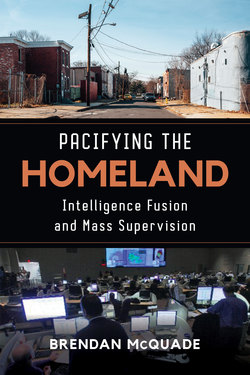Pacifying the Homeland

Реклама. ООО «ЛитРес», ИНН: 7719571260.
Оглавление
Brendan McQuade. Pacifying the Homeland
Отрывок из книги
Pacifying the Homeland
Intelligence Fusion and Mass Supervision
.....
This approach moves the analysis of fusion centers beyond the limiting confines of the policy debate. It reveals the broader meaning of Operation Padlock and the massive intelligence system upon which such police actions are predicated. The DHS-recognized National Network of Fusion Centers and the broader institutionalization of intelligence fusion in the United States is not a narrow topic with implications only for counterterrorism and security policy. Nor is it a legalistic matter of civil liberties and privacy protection. Instead, it offers insights into the changing administrative strategies that states use to pacify class struggle, administer poverty, and fabricate social order. While pacification highlights the issues obscured by other approaches, my research establishes the specificities of the current historical moment. The seventy-nine fusion centers recognized by DHS and the broader institutionalization of intelligence fusion are central, constitutive components of an increasingly prominent strategy of mass supervision. While mass supervision has long been an unacknowledged complement to mass incarceration, the dramatic expansion of the intelligence capacities of state and local police—during a time of falling prison populations—places empowered policing and ubiquitous surveillance at the center of mass supervision.
Mass supervision is an outgrowth and extension of the administrative strategies that constituted the state during the period of neoliberal globalization. This utopian project to radically remake world order largely succeeded, perhaps even pushing capitalism to its ecological and social limits. In the United States, many scholars and activists concluded that these changes produced either a workfare state, which imposed a new accord between labor and capital, or carceral state, which warehoused surplus workers, mostly racial minorities, who were left out of the new economic order. In today’s emergent post-neoliberal world defined by low growth, soaring inequality, and ever-expanding surplus populations, mass supervision helps shore up this workfare-carceral state and consolidate life organized around radical dependence on the market during a period of acute structural crisis. As the central component of mass supervision, the process of intelligence fusion mobilizes the decentralized surveillance capacities of state and private powers to render the complexity of social life legible as “intelligence.” The result is a potentially more supple system of social regulation that couples decentralized control with increased inter-institutional coordination across the state and private sector. In the short term, the institutionalization of intelligence fusion in the United States enables decarceration and an apparent rollback of the carceral state without addressing the underlying social problems at the root of mass incarceration. In the long term, it may be a novel strategy to pacify social unrest, necessary for a lasting reconfiguration of the state.
.....